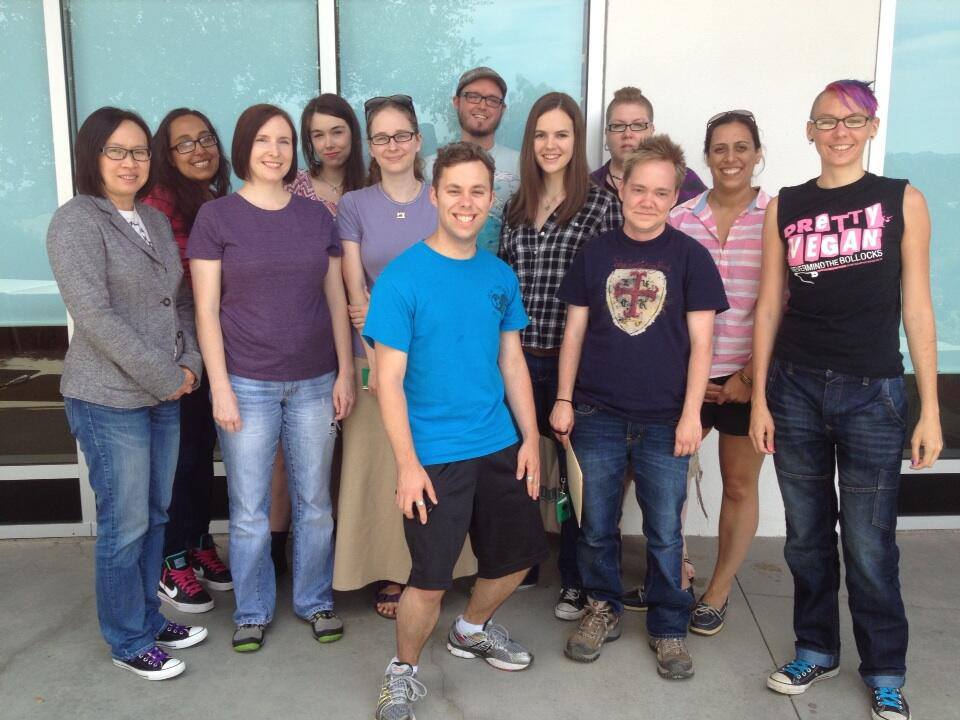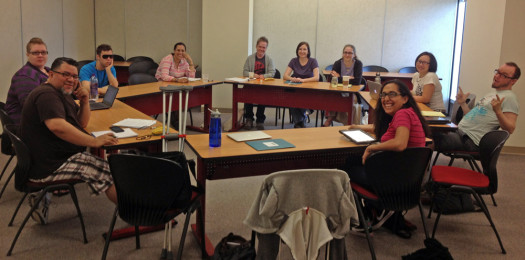Lambda Emerging Writers Retreat: An amazing week with queer writers
Last week I spent seven days in the company of LGBT writers at the Lambda Literary Foundation’s Writers Retreat for Emerging LGBT Voices. I taught twelve students (I had the privilege of choosing them from a pool of applicants) in the YA and Genre Fiction workshop. So much happened! Novels were workshopped, cake was eaten (many Leos had birthdays!), readings were had, whisky was sipped (sometimes too much), and oh yeah, we were all queer. It was amazing. The writers retreat was held at American Jewish University in Los Angeles, where we all stayed in dorm rooms (they had the same furniture I had at college in the 90s!) and ate in the dining hall (dining hall food hasn’t changed either).
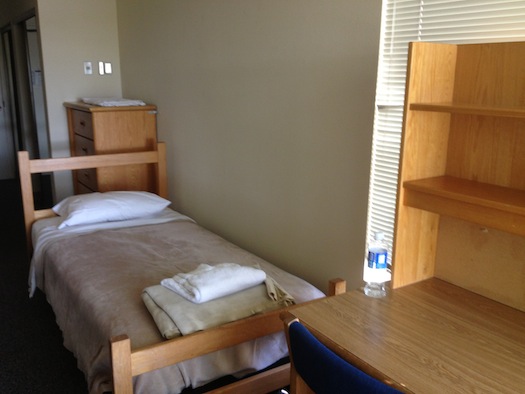
This is how the week went: On Monday I set things up by talking about the workshop format, and then I gave two talks on world-building and revision. I shared multiple revisions of one scene in Huntress to show how much a piece can change during revision. For the rest of the week, we followed the workshop format I was familiar with, in which the author listens to fellow writers discuss their piece without interrupting. In the last ten minutes of each hour, the author was allowed to respond to the comments and ask additional questions. We workshopped three 40-page samples (plus synopses) every day, with each writer getting one hour. It was intense!
Those workshops happened Tuesday through Friday. In the afternoons or evenings, the retreat invited guest faculty to lecture on various writing topics, and I also met one-on-one with my writers. By Saturday, the last full day of the retreat, we were all exhausted and exhilarated by the experience. On Saturday we talked about the business of publishing and what the writers had learned during their workshop experience, as well as what they planned to do when they went home.
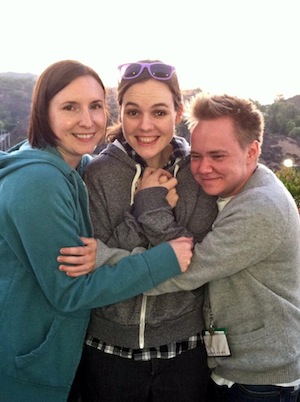
Going home was both a relief (my own bed! my own food!) and a let-down. I selected these writers to be in my workshop, but I hadn’t realized how much I’d become invested in them and their writing. They are all so talented, and I am grateful I had the chance to meet them and get to know their writing. I’m certain that you’ll hear from them in the future!
(Sidebar: I can't find any pictures of Tess Sharpe! So you should all go follow her on Twitter, because Tess's first YA novel, Far From You, comes out in Spring 2014 from Disney Hyperion.)
Probably the most rewarding aspect of the whole week was the fact that it was a retreat for LGBT writers. Everybody there was queer! In my workshop, we talked a lot about how the writers’ works-in-progress read in relation to our queer experiences, because this is something we pretty much all agreed we rarely get back home.
We have critique partners; we may even have editors. But those people are hardly ever queer (it’s not their fault), which means they read our work about queer characters from an outsider’s perspective. It’s important to get their opinions on our work, especially if we want our work to be read by non-queer readers. (We do.) But it’s amazing and affirming to have it read by insiders.
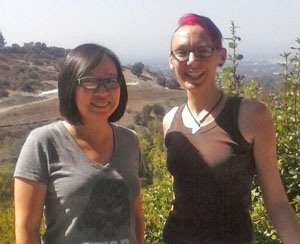
During the week I learned — or perhaps relearned — something very interesting. The experience of being queer is different everywhere. There were writers in my group from all across the U.S.A., Canada, and the U.K., and when we read each other’s stories about queer experience, we came to them from different perspectives. Coming out and being out is different everywhere. There are pockets of complete acceptance; there are places where they hate us; there are spaces where queerness thrives in the margins.
There is no one way to tell a queer story. There are multitudes of coming-out experiences.
And yet we all do share a baseline of common experience. We know what it’s like to discover that we’re not exactly normal, and we know that normal is a messed up concept anyway. We know what it’s like to negotiate our way to accepting our identities. We know that some people accept us more easily than others. And we all know that being queer isn’t a black-and-white thing; it can be fucked up and make us do things we wouldn’t do if we were straight.
Personally, I think that’s why first love for someone who’s queer can be so incredibly life-changing, in a turn-you-inside-out kind of way. First love, for someone queer, is the first time someone else has looked directly at you, seen you for who you are, and wanted you. In a world that often chooses to look away, that is incredibly powerful.
Even though I didn’t have my own writing workshopped at the retreat, I thought a lot about my writing too. I thought about what I owe to other queer readers, and what I owe to myself as a queer writer. I drew courage from these writers who are just starting out, who are writing what they love without the restrictions (yet) of mainstream publishing and public criticism and the ecosystem of Being an Author pushing them into a particular niche.
Don’t get me wrong — I love Being an Author. It’s a job that I fought very hard to have, and I understand that compromise is necessary in pretty much every occupation. Last week though, I thought a lot about the compromises I’ve made as a writer in order to tell queer stories that are accessible to straight readers as well as queer ones. I made those compromises because I don’t want to ghettoize myself, and I want to be read widely. But sometimes that has involved changing my writing to make what I’m saying easier to understand by those who haven’t had queer lives. Sometimes, I admit I feel like I’m doing queer readers a disservice because of that. Sometimes, I feel like I’ve made mistakes as a writer because of that.
There are things that I, as a lesbian, can say to my queer friends that I simply can’t say to my straight ones. There are things that my queer friends know about living in this world as queer people that my straight friends can sympathize with, but will never fully understand.
I don’t regret the decisions I’ve made as an author — I really don’t — but I feel that I’m at a point in my career where I’m going to be much more careful about making creative decisions that take the edges off queerness. I want to remember my workshop writers and how brave they are about telling their queer stories. As one of the writers said (and I’m paraphrasing): They’re already going to marginalize us; we don’t need to marginalize ourselves.
That’s what the Lambda writing retreat was about: putting queer writers in the center. It was a declaration that queer writers and writing about queer people is important. And it is.
Thanks to Lambda for inviting me to teach at this year’s retreat, and thanks to my students for being so talented and funny and generous and smart. You are an inspiration!
UPDATE: And now I have a photo of my entire YA and Genre workshop! Look at these fabulous writers (and me):
